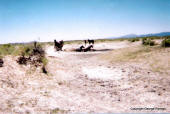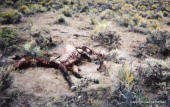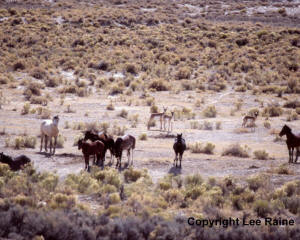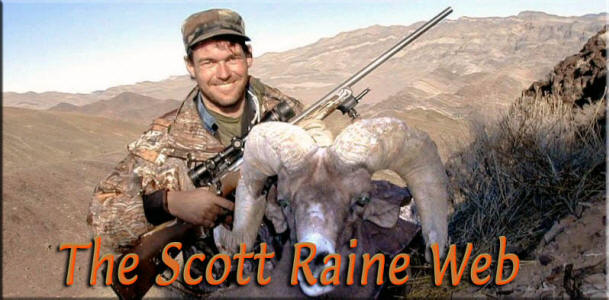|
George Parman on the Wild Horse Situation
Iím well into my seventies now. Iíve
been in and out of the ranching business all my life. Iíve run a lot of
horses - trapped coyotes and bobcats - cut post - over a good portion of
the state of Nevada, and I tell you, I have never been so disgusted.
For more than fifty years, all IĎve been hearing is how livestock are
destroying the range, how cruel the mustangers were, or how the trees
and bugs are being harmed. - when in fact, itís been the government and
all the do-gooders that have been the problem causers. Take the wild
horse issue for example. For years I thought people would wake up and
come to their senses someday, and things would get better. But instead
itís gotten worse. I just wish I knew how many horses have died because
of mismanagement in Nevada since ďThe Wild and Free Roaming Horse ActĒ
was passed in 1971. Itís got to be in the thousands. Even up until last
winter, there in Kobeh Valley there were at least a couple hundred
horses that were starving. But nothing was worse than what happened in
the country south of there in the 1990s. Clear from Highway 6, all the
way up through Little Sand Springs Valley and that country, clear to
Highway 50. The range was eaten off to nothing. Water holes were
tromped in - water developments destroyed. All because people from all
over the country seem to think they have to have a say in how our wild
horses are to be managed.
Iíve taken a lot of pictures of dying
horses over the years. Iím sending along three that were taken in the
area I just spoke of. The first picture shows horses attempting to suck
water from the mud of a spring, which has been nearly destroyed by the
trampling of horses. The second picture is a close-up of the spring
itself. And the third picture shows the end result. Note how the horse
in the third picture, has pawed the ground - too weak to get up -
suffering day after day, until the poor thing finally died. Just
imagine if you will, the total impact of these kinds of situations -
wildlife, livestock, everything suffers.



Click on pictures for larger views.
Horses, it should be remembered are
larger than most animals. Even under ideal conditions, when there is
plenty of feed and water on a range, theyíll run other livestock or
wildlife off a water hole. But when conditions like this occur, it can
be terrible. Dozens of horses, all standing around waiting for a chance
to suck mud or sip a little water, half of them being big studs, kicking
and fighting each other and fighting off all the younger and weaker
animals. Nothing can be more cruel than a bunch of mustang studs,
biting and kicking everything around them. No other animal can
compete. Colts get knocked down, trampled and separated from their
mothers - who are often so dehydrated they donít care whether they have
a colt or not. These pictures, Iím afraid, donít show to the full extent
the true horrors of it all. When these kinds of things happen, it
doesnít happen in just one small area or at just one water hole - it
happens over an entire rangeland.
The sad thing is, there seems to be no
end in sight for these kinds of tragedies. The number of radical animal
rights people and horse lovers, who in the end cause all the damage and
suffering seems to be growing. And to think the only solution that
anyone has come up with is the, adopt a horse program, or holding
facilities where thousands of horses are held indefinitely at the cost
of millions of dollars each year. To me, itís insanity. What we should
do is - we should return to the old days, when people living within
local communities decided what was best for the horses and resources
that are found within their communities. - People looking out their
windows of their clean and polished offices in Texas or Colorado
dreaming about the mustangs they own in Nevada, while the horses
themselves starve and more and more ranchers are forced out of
business. No, what we need to do, is to let the ranchers and the
mustangers take care of the problem, just as they did in the old days,
back when, along in the Fall a handful of cowboys would take their
saddle horses - throw a bunch of grub and their bedrolls in the back of
a pickup - and off theyíd go to do a little mustanging. It was a
perfect system. The most qualified and experienced people were
engaged. The horses were automatically kept at reasonable numbers. It
cost the taxpayer nothing. The best of the horses were put on the market
for people to use and enjoy. The remainders of the older and less
undesirable animals were euthanized via a facility that made good use of
the end product. Rangelands were not overstocked. Springs were kept
open and maintained by the ranchers. The cattle had plenty to eat. The
horses had plenty to eat. Wildlife did well. Everything was better.
Of course no one would agree to something
like that. What would all the wild horse people do if they agreed to
something like that? They wouldnít have a cause to pursue, or anything
to bitch about. What about the people that administer the program? It
wouldnít do to put them out of work - especially during times of high
unemployment. And so, I suppose we will go on, doing as we have in the
past, even if our rangelands continue to deteriorate, the horses
continue to suffer, and more and more ranchers are put out of business.
Itís insanity, I tell you, itís insanity. But thatís the way things are
done these days.
George Parman, Eureka Nevada 1/25/10

A photo of feral horses keeping wildlife away from
the water taken at a small spring in Kobeh Valley. The
buckskin stallion drank first and now keeps watch until his mares
have drunk their fill. Three antelope await their chance.
Other mare bands wait as well.
Click on photo for larger view. Photo by Lee Raine.
|
